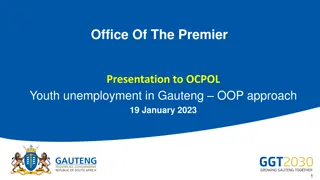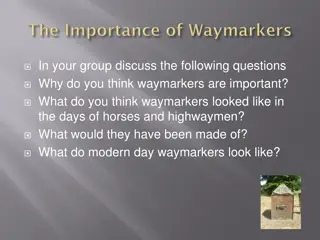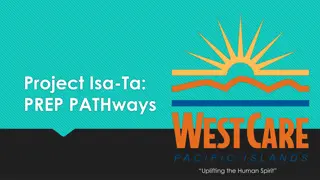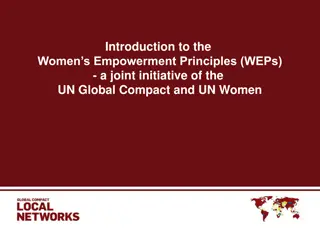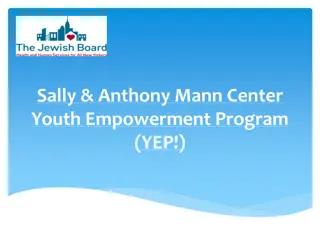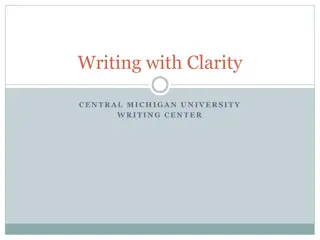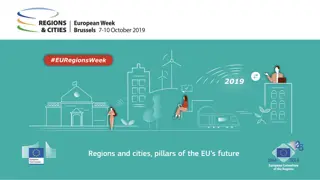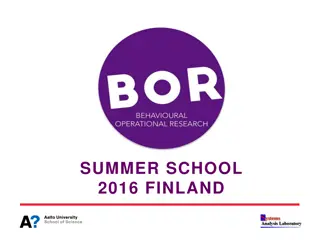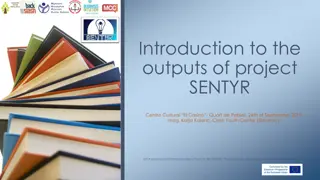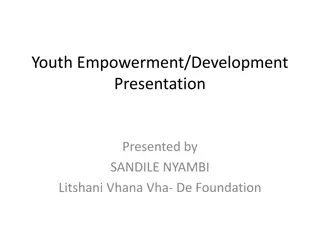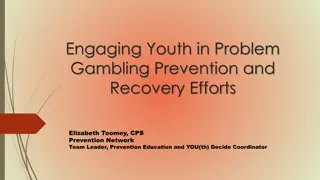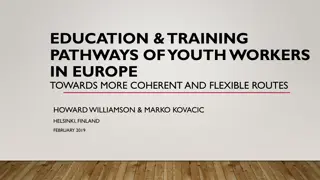Guideposts for Youth Success: A Path to Empowerment
Explore the Guideposts for Success framework, designed to guide youth, families, schools, and agencies in supporting young adults, including those with disabilities, through post-secondary transition. Learn about the key areas of focus, the importance of utilizing these guideposts, and the impact on empowering youth for successful futures.
Download Presentation

Please find below an Image/Link to download the presentation.
The content on the website is provided AS IS for your information and personal use only. It may not be sold, licensed, or shared on other websites without obtaining consent from the author.If you encounter any issues during the download, it is possible that the publisher has removed the file from their server.
You are allowed to download the files provided on this website for personal or commercial use, subject to the condition that they are used lawfully. All files are the property of their respective owners.
The content on the website is provided AS IS for your information and personal use only. It may not be sold, licensed, or shared on other websites without obtaining consent from the author.
E N D
Presentation Transcript
Guideposts for Success 10/1/2024 Life and Career Skills Presentation created by: Guideposts for Success Subcommittee CT State Department of Education Transition Task Force Based upon material created by the National Collaborative on Workforce and Disability (NCWD) 2013 1
2 10/1/2024 What are the Guidepost for Success? The Guideposts are a framework of five key areas that can help steer families, institutions and youth themselves through the post secondary transition process. They are: School-Based Preparatory Experiences Career Preparation & Work-Based Learning Experiences Youth Development & Leadership Connecting Activities Family Involvement and Supports
3 10/1/2024 Who will be interested in this information? Youth, families, schools and adult agencies working with young adults toward employment Anyone who works with young adults (including young adults who have disabilities) who are preparing for employment
4 10/1/2024 Why use the Guideposts for Success? created with a collaborative team, including a diverse group of young adults created to help address some key issues in secondary education and transition services (NCWD, 2009) created based upon current research and practice for all students, including students who have disabilities created to keep employment at the forefront now being used by the CT Department of Education and Bureau of Rehabilitation Services as a framework for post secondary transition planning
5 10/1/2024 Why is this information important for youth who have disabilities? Because studies confirm that young adults with disabilities are three times [more likely] to live in poverty as adults than their peers without disabilities. Because studies confirm that youth who have disabilities have higher dropout rates, are less likely to attend post secondary education and are involved with juvenile corrections at a much higher rate than their peers without disabilities.
6 10/1/2024 Why is this information important for youth who have disabilities?(Cont d) So that stakeholders understand that barriers to successful transition are: Little or no expectation of success Low educational attainment Few vocational goals Confusing government programs with conflicting eligibility criteria have resulted in many youth with disabilities not making a successful transition
7 10/1/2024 Why include additional information for youth who have disabilities? All youth struggle with the transition from high school to post secondary education/training and/or work All students need help preparing for the adult world and employment AND youth who have disabilities often need additional supports
8 10/1/2024 What do the Guideposts for Success suggest? Interventions that make a difference include: Work-based learning experiences connected to curriculum content Student-centered individualized education programs Family involvement Linkages to individual support services (see handout: Guiding Todays Potential Preparing Tomorrows Workforce)
9 10/1/2024 The Guideposts are based on the following assumptions: High expectations for all youth Equality Full participation Independent living Competitive employment and economic self-sufficiency Individualized, person-driven, and culturally and linguistically appropriate transition planning
10 10/1/2024 The Guideposts are based on the premise that ALL students need: Access to high quality standards-based education Information about career options and exposure to the world of work Opportunities to develop social, civic, and leadership skills Strong connections to caring adults Access to safe places to interact with their peers Support services to allow them to become independent adults
11 10/1/2024 Guidepost 1 School-Based Preparatory Experiences All youth need to participate in educational programs based on meaningful, accurate, and relevant indicators of student learning skills.
12 10/1/2024 School-Based Preparatory Experiences All Youth Need: Supports from and by highly qualified staff Access to an assessment system that includes multiple measures Graduation standards that include options Academic programs Career and technical education programs Curricular and program options Learning environments that are small and safe
13 10/1/2024 School-Based Preparatory Experiences Additionally, youth with disabilities need: To develop knowledge of reasonable accommodations Be supported by highly qualified transitional support staff that may or may not be school staff. Individual transition plans to drive the transition process post- schooling Access to specific and individual learning
14 10/1/2024
15 10/1/2024 Guidepost 2 Career Preparation and Work- Based Learning Experiences Career preparation and work-based learning experiences are essential in order for youth to make informed choices about careers.
16 10/1/2024 Career Preparation And Work- Based Learning Experiences In order to identify goals, youth need: Opportunities to engage in a range of work-based exploration Multiple on-the-job training experiences Opportunities to learn and practice their work skills and soft skills Opportunities to learn first-hand about specific skills related to a career
17 10/1/2024 Career Preparation and Work- Based Learning Experiences Additionally, youth with disabilities may need to: Understand the relationship between benefits planning and career choices Learn to communicate their disability-related work support and accommodation needs Learn to find, and secure appropriate supports and reasonable accommodations in education, training, and employment settings
18 10/1/2024
19 10/1/2024 Guidepost 3 Youth Development and Leadership Youth development is a process that prepares young people to meet the challenges of adolescence and adulthood. Youth leadership is part of that process.
20 10/1/2024 Youth Development and Leadership All Youth Need: Mentoring activities designed to establish strong relationships Exposure to role models Training in self advocacy and conflict resolution skills Exposure to personal leadership and youth development activities Opportunities that allow youth to exercise leadership and build self-esteem
21 10/1/2024 Youth Development and Leadership Additionally, youth with disabilities may need: An understanding of disability history, culture, and disability public policy issues as well as their rights and responsibilities Mentors and role models including persons with and without disabilities
22 10/1/2024
23 10/1/2024 Guidepost 4 Connecting Activities Young people need to be connected to programs, services, activities, and supports that help them gain access to post-secondary options.
24 10/1/2024 Connecting Activities Other possible resources youth may need: Mental and physical health services Transportation Housing Tutoring Financial planning and management Post-program supports through structured arrangements in postsecondary institutions and adult service agencies Connection to other services and opportunities (e.g. recreation)
25 10/1/2024 Connecting Activities Youth with disabilities may need: Exposure to post- program supports e.g. independent living centers Personal assistance services Benefits-planning counseling Acquisition of appropriate assistive technologies Community orientation and mobility training
26 10/1/2024
27 10/1/2024 Guidepost 5 Family Involvement and Supports Participation and involvement of parents, family members, and/or other caring adults essential for the post-secondary transition and development of individuals with disabilities.
28 10/1/2024 Family Involvement and Supports All youth need parents, families, and other caring adults who do the following: Provide access to information about employment, education, & community resources Take an active role in transition planning Have access to medical, professional, and peer support networks Have high expectations Foster youth s ability to achieve independence and self-sufficiency Remain involved and assist them toward adulthood
29 10/1/2024 Family Involvement and Supports Youth with disabilities need parents, families, and other caring adults who have: Knowledge of and access to programs, services, supports, and accommodations An understanding of how planning tools can assist youth in achieving transition goals and objectives An understanding of the youth s disability and how it may affect education, employment, and daily living options Knowledge of rights and responsibilities under various legislation
30 10/1/2024
31 10/1/2024 How can YOU use these Guideposts? Families can: Prepare for PPT meetings Talk with your son/daughter about planning for life after high school Educators can: Review IEP transition goals for gaps Assist students and families to develop a comprehensive transition process Adult service & post secondary professionals can: Provide information and resources to facilitate smoother transitions to the adult world Align services with the five guidepost areas
32 10/1/2024 Additional resources http://www.ncwd-youth.info/guideposts Guideposts for: Employers Success Youth Involved in the Juvenile Corrections System Youth in Foster Care Youth with Mental Health Needs Youth with Learning Disabilities Families
33 10/1/2024 Where can I get more information? CT State Department of Education, Transition Task Force Patricia L. Anderson, Ph.D. Education Consultant CT State Department of Education Bureau of Special Education 860-713-6923 patricia.anderson@ct.gov
34 10/1/2024 Acknowledgements A special thank you to the members of the Guideposts for Success Subcommittee of the Connecticut Transition Task Force who developed, guided, and edited this presentation: Patti Clay Bureau of Rehabilitation Services (BRS) Cathy Felice Tunxis Community College Cathy Forker State Education Resource Center (SERC) Khampasong Khantivong Bureau of Rehabilitation Services (BRS) Chris Librandi Fairfield Public Schools Christopher McCray Student Representative Beth Reel CT Parent Advocacy Center (CPAC)
35 10/1/2024 Acknowledgements, continued Valerie Reyher The Kennedy Center, Inc. Barry Rita Board of Education & Services for the Blind (BESB) Dorine Russo School Counselor Pamela J. Starr Eastern Connecticut State University (ECSU) Cindy Stevenson Department of Developmental Services (DDS) John Van Hare African & Caribbean American Parents of Children with Disabilities (AFCAMP) And, to Patricia L. Anderson, Ph.D., CT State Department of . Education, Bureau of Special Education/Bureau of Rehabilitation Services (BRS), for her ongoing leadership and dedication to improving the lives of students with disabilities
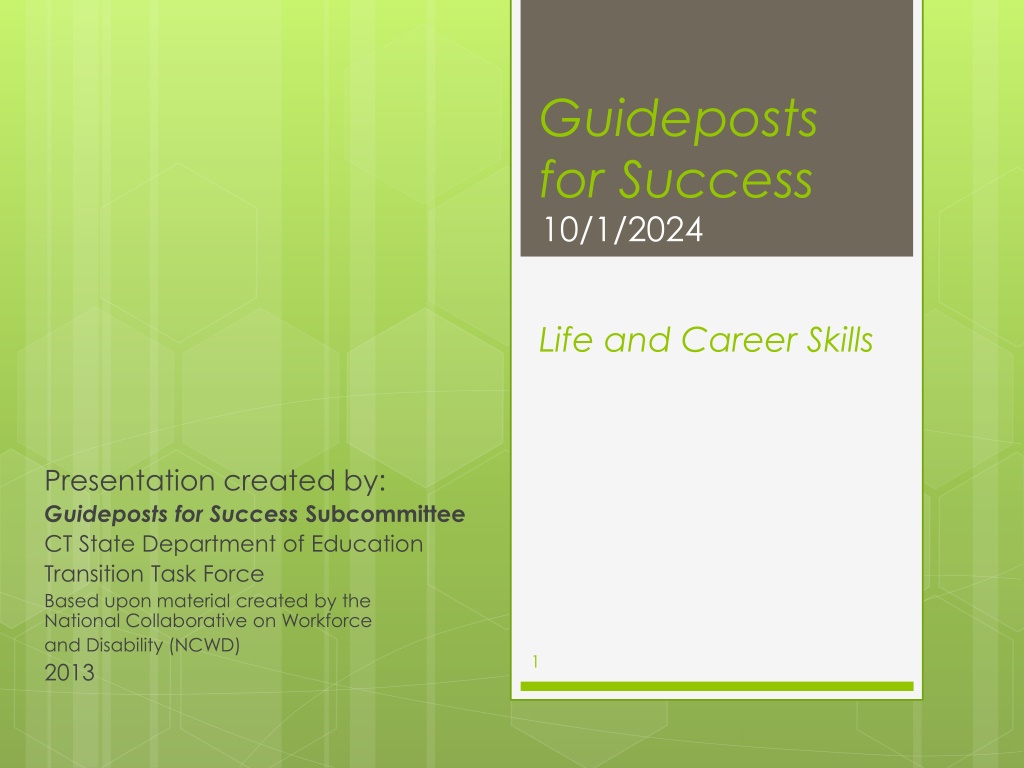
 undefined
undefined














